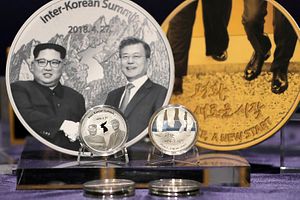Three of Asia’s most enduring flashpoints are rooted in acts of territorial partition dating back to the 1940s. Diverse as they are, the emergence of the new states of Israel and Pakistan, and the “temporary” division of Japanese-occupied Korea by the victorious United States and Soviet Union, each created a festering stand-off: at best a tense peace, punctuated by episodes of savage conflict.
Seventy years on, all these situations retain their capacity to explode into conflagration, now potentially nuclear. Conversely, none of this trio looks remotely close to any resolution that would definitively eliminate risk, much less heal the original wounds. Perhaps all must be considered permanent, with conflict management and containment the best we can hope for.
That said, while underlying tensions persist, the ambient weather and atmospherics in such hotspots can alter dramatically; rarely more so than on the Korean Peninsula in recent months. The contrast is startling. As 2017 drew to a close, Kim Jong Un, still only 34, was entering his seventh year as North Korea’s supreme leader – a role he inherited, with scant time to prepare, in December 2011 when a fatal heart attack claimed his long-ailing father Kim Jong Il.
Remarkably, perhaps uniquely, during those first six years Kim Jong Un neither left his realm nor met any other head of state; not even old allies like China. This reinforced the image of North Korea as a hermit kingdom. The term has become a cliché, but that does not make it false. It was first used in reference to the Daewongun, Korea’s regent during 1863-73, whose reaction to the wider world’s encroachment was to batten down the hatches and try to keep everyone out while attempting reforms at home. That failed. China, Russia and Japan all fought over Korea – a “shrimp among whales,” as a glum Korean proverb has it. Predictably, ascendant Meiji Japan saw off the other two declining empires, occupying Korea until defeated in 1945. All Koreans know this harsh history, though the two post-1945 states on the peninsula drew sharply different lessons from it.
But 2018 has brought a welcome and unexpected turn to peace, at least for now. Most startlingly, Trump and Kim not only stopped calling each other childish names but have actually met, in the first ever U.S.-North Korea summit in Singapore on June 12. Moreover, by then, the artist formerly known as a hermit had already racked up five other summit meetings in as many months, in a dazzling display of deft diplomacy and subtle sequencing.

































